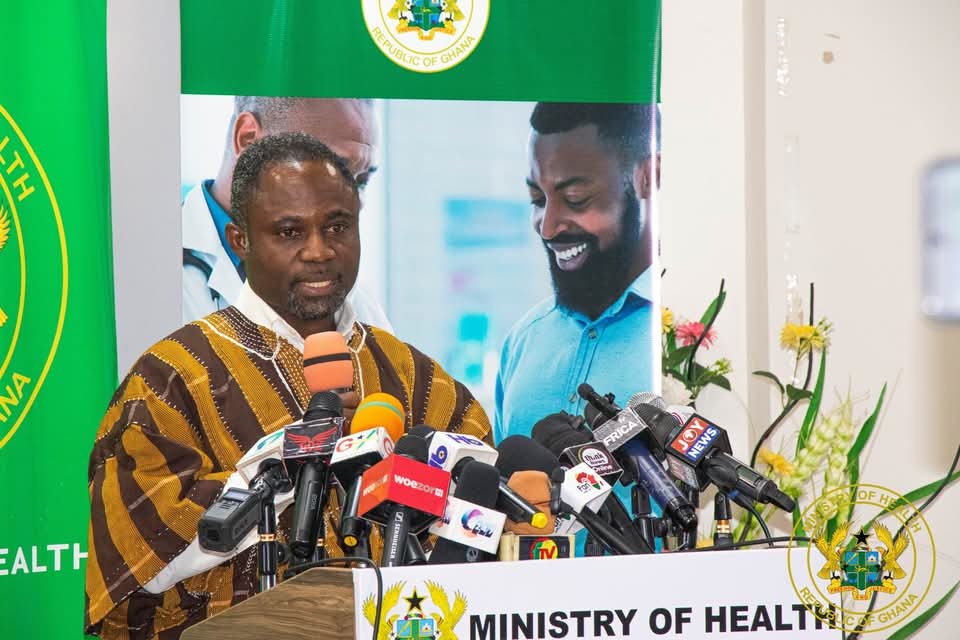News
Health minister launches Ghana Medical Cares Trust Fund Taskforce

The Minister for Health, Kwabena Mintah Akandoh, has officially inaugurated the Ghana Medical Care Trust Fund (MahamaCares) Taskforce to oversee the successful implementation of the initiative.
MahamaCares, an initiative of His Excellency President John Dramani Mahama, aims to provide dedicated financial support to individuals suffering from chronic and debilitating illnesses.
The initiative is designed to ensure fairness in healthcare access, particularly for those facing financial barriers to treatment.

Addressing the gathering, Mr. Akandoh highlighted that while the National Health Insurance Scheme (NHIS) has improved medical coverage, it does not completely ease the financial burden of treating chronic diseases.
He stated, “The Ghana Medical Trust Fund is a bold response to this challenge. It’s purpose is clear: no Ghanaian should choose between their health and financial ruin.”
He noted that the taskforce has been tasked with developing a strong policy and legal framework to establish MahamaCares as a statutory entity.
In addition, the team will be responsible for designing a sustainable funding model to ensure the long-term viability of the fund, setting clear eligibility and disbursement criteria to guarantee fairness, and evaluating Ghana’s healthcare infrastructure to recommend improvements for better accessibility.
Rev. Prof. Emeritus Seth Aryeetey, Chairman of the nine-member taskforce, expressed his immerse gratitude to the President and the Minister for the opportunity to serve.
He assured that the taskforce would work diligently to ensure the success of the MahamaCares initiative and deliver on its mandate effectively.
Other members of the taskforce include; Prof. Emeritus Binka – former Vice Chancellor of the University of Health and Allied Sciences, Prof. Margaret Kweku – Public Health Consultant, Dr Alfred Doku – Consultant Cardiologist, Dr. Radolph Nsor-Ambala – financial expert, Dr Anthony Gingong – representative of the National Health Insurance Trust Fund, Dr. Anthony Seddoh – Health Policy and financing expert, Anna Pearl Akiwumi Siriboe – lawyer and the Attorney General’s representative for the committee and Dr Belinda Afriyie – Public Health Consultant Secretary for the Taskforce.
News
Prioritise affordable treatment of sickle cell treatment —Health Expert

Health experts have urged Ghana to prioritise affordable and accessible treatment for sickle cell disease (SCD) as advanced, but costly curative therapies remain out of reach.
SCD, an inherited blood disorder, affects about three in every 100 newborns in Ghana.
Globally, around 1,000 babies are born with the condition daily, with three-quarters in sub-Saharan Africa.
The disease causes severe complications including chronic pain, anaemia, infections, strokes and organ damage, often leading to shortened life expectancy.
In recent years, gene therapy has been developed as a potential cure.
However, its cost—running into millions of dollars per patient—makes it financially and technically inaccessible in Ghana.
According to Dr Lawrence Osei-Tutu, a Sickle Cell and Childhood Cancer Expert at the Komfo Anokye Teaching Hospital, “the country must instead focus on practical, lower-cost interventions such as hydroxyurea”, a decades-old cancer drug proven to reduce painful episodes, hospitalisation and life- threatening complications in SCD patients”.
Taken orally, the medicine improves red blood cell function and is considered safe and effective.
“Hydroxyurea therapy is as good as the cure and a low-hanging fruit to pluck, we must bring a cure to our sickle cell warriors, but do so sustainably.” he urged.
In a chat with The Spectator here, he said to create awareness on the disease, the expert noted that despite its benefits, “hydroxyurea is not widely accessible in Ghana.”
Stressing that, “many patients either cannot afford it or struggle with irregular supply through the health system.”
Moreover, he argued that scaling up access would provide immediate relief while the country builds the infrastructure, trains specialists and secures funding needed to support curative therapies in the future.
With an estimated 15,000 babies born with sickle cell disease annually in Ghana, Dr Osei Tutu cautioned that “failure to improve access to effective treatment will leave many patients vulnerable to preventable complications and early death.”
From Kingsley E. Hope, Kumasi
Join our WhatsApp Channel now!
https://whatsapp.com/channel/0029VbBElzjInlqHhl1aTU27
Hot!
Let’s reintroduce Cultural Studies to complement educational reforms — Tourism Minister

Madam Abla Dzifa Gomashie, the Minister of Tourism, Culture and Creative Arts, has emphasised the importance of reintroducing Cultural Studies in schools as part of Ghana’s broader educational reform agenda.
She said Cultural Studies would complement existing efforts to reposition Science, Technology, Engineering and Mathematics (STEM) and Technical Vocational Education and Training (TVET) to promote digital literacy and expand Creative Arts education.
Speaking at the 2025 Homowo Festival of the people of Ningo-Prampram, held on the theme: “Education: The Best Legacy for our Children,” Madam Gomashie said cultural education was critical to national identity and development.
She noted that the festival’s theme aligned with the Government’s vision to transform education in Ghana and encouraged the youth to embrace it not only as a means of personal development but also as a way of preserving traditional values.
These values, including patience, wisdom, and hard work, were at the core of the Homowo celebration, the Minister said.
“Cultural festivals like Homowo are vital instruments for strengthening cultural identity, preserving historical memory, and fostering national unity. Additionally, festivals serve as platforms for educating the youth through storytelling, music, dance, and other traditional practices, while also providing opportunities for community engagement.”
Madam Gomashie highlighted the strong foundation that Ghana’s tourism was built on, which included culture, traditions, and the creative industry, collectively contributing to over GH¢4.8 billion to the economy.
“Festivals give tourists reasons to visit our country. Therefore, with the right infrastructure and the development of all the domains, the sector can do more than what has been recorded,” she added.
Mr Sam Nartey George, the Member of Parliament for Ningo-Prampram and Minister of Communication, Digital Technology and Innovation, commended the community for their vibrant participation in the festival. He announced plans for the construction of a new nursing training school in Ningo, aimed at expanding access to healthcare education in the area.
Nene Osroagbo Djangmah XII, Paramount Chief of Great Ningo Traditional Area; King Dr Tackie Teiko Tsuru II, Ga Mantse; Nene Tetteh Wakah III, Paramount Chief of the Prampram Traditional Area; Prof. Odaifio Welentsi III, Paramount Chief of the Nungua Traditional Area; Naana Dugbakuwor Dugba II, Paramount Queen Mother of Great Ningo; and Mr. Elvis Afriyie Ankrah, Special Envoy on Religion and Inter-Faith Affairs, who represented the Chief of Staff, were among dignitaries at the festival. -GNA














